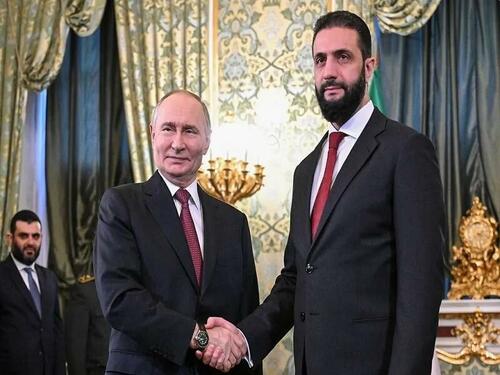Authored by Andrew Korybko via Substack,
Lavrov suggested that they could facilitate the dispatch of aid to Africa, but it’s also possible that they might host complex military-diplomatic talks between all stakeholders in Syria while also helping its armed forces maintain national unity by re-equipping, training, and advising them too.
Russian-Syrian relations are interesting for many observers due to the realpolitik that’s come to define them since Assad’s downfall last December.
Ahmed “Jolani” Sharaa’s Al Qaeda-descended Hayat Tahrir al-Sham was designated as terrorists by Russia prior to their Turkish-backed seizure of power, and they accordingly hated Russia for bombing them, yet both swiftly put that aside. The fact of that matter is that their respective state interests require continued cooperation regardless of whoever’s in power in Syria.
Russian Foreign Minister Sergey Lavrov hinted at the future of his country’s bases there in an interview that aired last week ahead of Sharaa’s trip to Moscow on Wednesday to meet with Putin.
While their summit was certainly important, Lavrov’s remarks shed more light on this subject than the opening statements from their talks (there was no press conference afterwards), which is why his words form the basis of this analysis.
Here’s exactly what he said, which will then be analyzed:
“The function must be reconfigured. One clear task that could benefit the Syrians, their neighbours, and many other countries is establishing a humanitarian hub, utilising the port and airport to deliver humanitarian supplies from Russia and the Persian Gulf states to Africa.
There is a shared understanding that this will be in demand, and we are prepared to coordinate the details. The matter has, in principle, been discussed, and there is mutual interest.”
This is a unique proposal that would allow these facilities to become logistical hubs for supplying Russian, Arab, and possibly others’ aid to Africa. Russia’s continued dispatch of donated foodstuffs, mostly wheat, as well as discounted energy and fertilizer helped avert a chain reaction of tragedies over the past 3,5 years that could have exploded due to the West’s unilateral sanctions.
There might be more to the future of Russia’s bases in Syria than just that, however, judging by what else Lavrov said:
“We understand Israel’s legitimate security concerns (in Syria)…
Yet, the interests of other actors must also be safeguarded. In the northeast, there are the Kurds, whom the Biden administration began courting, actively encouraging separatist sentiments.
Our Turkish counterparts maintain a presence in the north, along their border with Syria. Meanwhile, Alawites and Christians continue to face persecution – recently exemplified by a barbaric attack on a church.”
He then added that all those with influence in Syria must prioritize its unity and declared that “We are prepared to collaborate on these matters with other nations pursuing their interests in the Syrian Arab Republic.”
Accordingly, it can be intuited that Russia’s military facilities could hypothetically host security talks between these conflicting parties, while its armed forces and diplomats could also provide advisory services to their Syrian counterparts to advance their shared goal of maintaining national unity.
Therefore, while the official reason for retaining Russia’s bases in Syria might be to facilitate aid to Africa and possibly host complex military-diplomatic talks, the real purpose might be to re-equip, train, and advise its army, albeit within the unofficial limits imposed by Israel and agreed to by Syria in that event.
This vision was first shared in early February here and thus presciently predicted what’s thus far come to pass. These plans could still be offset, but for the time being, they arguably appear to be on track.
Loading recommendations...
